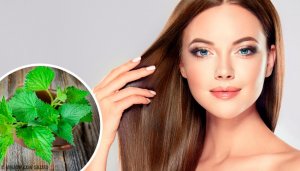The Benefits of Nettle for Your Hair

Did you know the benefits of nettle to help fight dandruff and hair loss? It’s true:, this plant that spontaneously grows in many places is a powerful ingredient for hair care.
Your hair demands certain care given that it can be affected by many different environmental factors. In addition to that, the action of free radicals on your scalp is very strong. It causes skin deterioration, and causes dandruff and other issues.
Fortunately, to take care of your hair, there are a few alternatives with the end goal of counteracting the damages and causing growth, boosting its shine, etc. It should be emphasized that the majority of these very effective alternatives are completely natural.
Nettle

Nettle is a very common plant. It grows in humid areas. Generally, it grows near a body of water (lake, river, pond, etc.) In fact, it’s a part of the weed group that, sometimes, people try to eliminate at all costs in their gardens.
Nettle is a plant that has various properties: it’s antibacterial, antihistamine, purifying, and anti-inflammatory. Thus, it has many uses, although it’s usually used in teas or tonics.
In herbal food shops, you can find it in capsules. However, this isn’t the most known method, nor the most beneficial. You can also eat it directly (in salads, for example).
Also read: Herbs and Spices that Encourage Hair Growth
The Benefits of Nettle for Your Hair
Nettle is very useful for taking care of your hair because it helps regulate grease production on your scalp and releasing built-up free radicals. Consequently, it promotes capillary health.
The people who are familiar with this plant usually include some leaves in their shampoo that they use every day to enjoy all of its benefits. On the other hand, they include them in their homemade hair masks, tonics, and more.
Nettle is a plant that’s rich in vitamins A, B, C, E and minerals such as iron, calcium, sulfur, magnesium, and zinc.
1. It Prevents Hair Loss

While stimulating blood flow, hair follicles become stronger and this prevents them from falling out or becoming brittle.
2. It Regulates Grease Production
Grease is one of the most complicated issues when it comes to daily hair care. However, it’s a very common problem and it has a solution.
Excess sebum and the accumulation of foreign particles can be something very annoying to you. Luckily, a plant like nettle helps regulate excess oil.
How do you do it?
By purifying the toxins in your hair and combating the bacterias that cause an increase in grease production on your scalp.
We recommend you read: Caring for Your Scalp Every Day
3. It Strengthens Your Hair

In sight of the previously mentioned benefits, hair experiences a considerable strengthening when you regularly use nettle. However, this plant’s secret isn’t just that it’s rich in vitamins and minerals, but also that it’s a powerful hydrating agent.
By washing and hydrating your hair, it boosts your hair’s volume and the quality of new hairs that start to grow. Therefore, after about a week of using it, your hair will look much healthier. After a month, you will enjoy splendid melanin.
How to Take Advantage of This Plant
To enjoy all of the benefits this plant has to offer for hair care, you can make a tea from fresh nettle leaves.
- Once you have them, boil 200 ml, or one cup, of water in a pot.
- When the water begins to boil, add the nettle and lower the heat.
- Wait 5 minutes and turn off the flame.
- You can drink this tea or apply it directly to your hair after washing it with your normal shampoo.
- Repeat this process frequently and little by little, you will see the results.
Also, you can enjoy the plant leaves in green smoothies, stews, salads, etc. Be creative!
All cited sources were thoroughly reviewed by our team to ensure their quality, reliability, currency, and validity. The bibliography of this article was considered reliable and of academic or scientific accuracy.
- Anoniem. (2003). Stinging nettle. Journal of Allergy and Clinical Immunology. https://doi.org/10.1109/OFS.2002.1000562
- Di Virgilio, N., Papazoglou, E. G., Jankauskiene, Z., Di Lonardo, S., Praczyk, M., & Wielgusz, K. (2015). The potential of stinging nettle (Urtica dioica L.) as a crop with multiple uses. Industrial Crops and Products. https://doi.org/10.1016/j.indcrop.2014.08.012
- Ahmed KK, M., & Parsuraman, S. (2016). Urtica dioica L., (Urticaceae): A Stinging Nettle. Systematic Reviews in Pharmacy. https://doi.org/10.5530/srp.2014.1.3
This text is provided for informational purposes only and does not replace consultation with a professional. If in doubt, consult your specialist.








